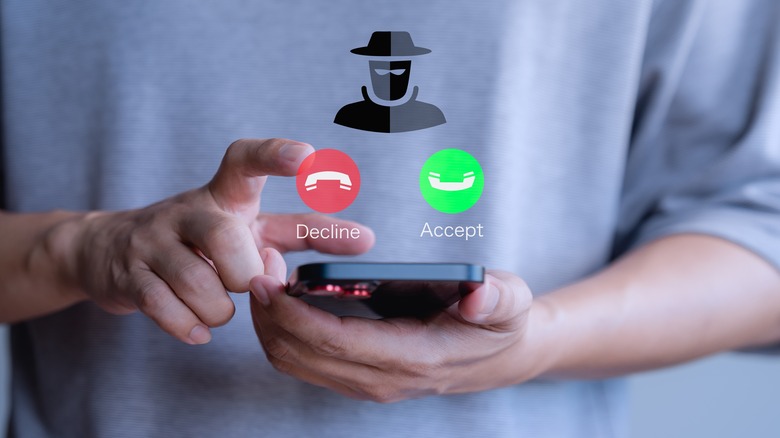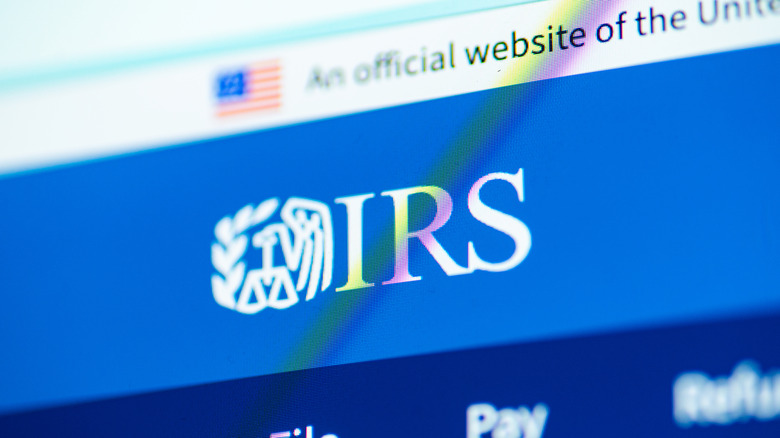Will The IRS Call You? Don't Fall For These Scams
Scammers often pretend to be Internal Revenue Service (IRS) agents, which is successful due to most people's fear of tax-related trouble. However, the IRS never starts a case with a phone call. It also will not demand payment using gift cards, prepaid debit cards, or wire transfers at any point during an audit or even if you don't pay your taxes on time. Instead, the agency will send you a bill by U.S. mail — a notice that gives you a chance to ask questions, or even dispute any owed amount. In an alert issued May 2025, the IRS warned that any caller who threatens arrest, or demands payment with a gift cards, is running a scam.
Scammers have ways of making their schemes seem official — from using fake caller-ID numbers in order to leave threatening voicemails to artificial intelligence-generated financial scams with AI voices to sending phishing text messages or emails containing links to fake IRS websites. In a June 2025 advisory, the Federal Trade Commission said that email was the most common method that scammers used to make contact with would-be victims.
These scams also generally increase during tax filing season. In 2024, Americans lost about $1.9 billion to fraud involving calls, texts, and emails, per the Federal Trade Commission. By 2025, the IRS had added fake phone calls to its annual "Dirty Dozen" list of top tax scams to avoid. The agency's advice if you receive one of these phone calls? Hang up.
IRS phone-related scams to watch out for
Scammers may also lead with a promise instead of a threat. One common method is by saying that the IRS owes you a refund recalculation before asking you to confirm your bank details to send the money. Another scam might pretend to be part of the IRS's private debt collection program. Meanwhile, in reality, only three companies — CBE Group, Coast Professional, and ConServe — are allowed to call about unpaid taxes, and even then only after you have received IRS Notice CP40 and a letter from the agency. According to the IRS, these official collectors will never ask for gift cards or wire transfers and will always tell you to pay the U.S. Treasury. If someone calls before those two letters arrive, or pressures you to pay right away, it is likely a scam.
Scammers also often use text messages to push a tax transcript scam. The message might say that you owe back taxes and will offer a link to view your file — however, the link will instead install malware or take you to a fake sign-in page created to steal your Social Security number and bank details. If you get a message like this, forward it to 7726 (SPAM) and delete it right away. Any unexpected text that claims to be from the IRS is a red flag.
How to verify suspicious emails
Start every email check by looking at the sender's address. The IRS will not start cases by email, and will never ask for personal or bank details via email either. Legitimate emails will always end in "irs.gov", not irs.com or any other domain, so hover over every link to pre-check a URL without clicking it. Also remember that scam emails are not always inventive, with scammers often using the same email text for various targets. This means you can copy and paste the email text into a search engine to see if others have reported the same scam.
This same rule applies to calls and texts. If someone calls and says they're from the IRS, go to the IRS' official website to find the official number and call it yourself. The IRS almost always starts with a letter, so any demand that skips the mail step is suspicious. Also, make sure to keep any evidence and send suspicious emails or phone numbers to phishing@irs.gov with a short note. Similarly, you can report tax scam calls to the Treasury Inspector General for Tax Administration via phone or an online form. You can also file a complaint at ReportFraud.ftc.gov to help investigators track patterns, and shut down larger scam campaigns. Write down dates, times, and details about any callers, as those notes can help speed up investigations, and protect other taxpayers.


